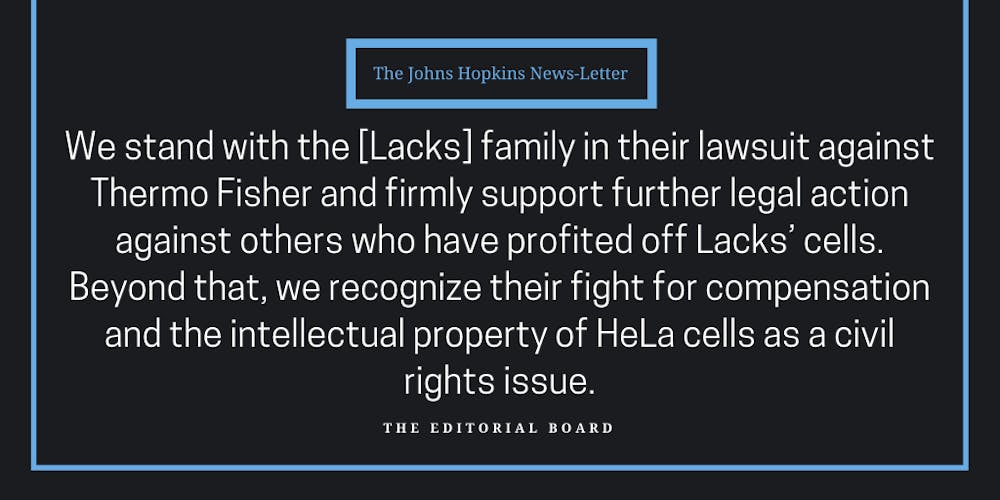Last week, the family of Henrietta Lacks filed a lawsuit against biotech company Thermo Fisher Scientific. Seventy years ago, Lacks sought treatment for cervical cancer at Hopkins Hospital, where doctors harvested her cells without her knowledge. Following her death, her immortal cells, known as the HeLa cell line, would revolutionize modern medicine. Yet the Lacks family was kept in the dark about the mass production and commercialization of her cells for over two decades; to this day, her family has not received monetary compensation.
While Hopkins did not profit off the cell line, it has not issued a formal apology to the Lacks family, either. We believe appropriate acknowledgment of its role in this violation and an apology to the Lacks family are long overdue.
On Tuesday, the Milton S. Eisenhower Symposium hosted the family’s attorney, Benjamin Crump, whose past civil rights advocacy includes representing the families of Trayvon Martin and George Floyd. Crump’s talk served as a reminder of the Lacks family’s ongoing struggle for justice. We stand with the family in their lawsuit against Thermo Fisher and firmly support further legal action against others who have profited off Lacks’ cells. Beyond that, we recognize their fight for compensation and the intellectual property of HeLa cells as a civil rights issue.
Even though it is not currently being sued, we believe Hopkins must further acknowledge the harm it has done to the Lacks family and offer support in their search for justice and relief.
Despite not issuing an apology, the University announced it would name a research building after Lacks in 2018. Progress on this project is unclear, however, as the University has not issued an update on this initiative since 2019. Regardless of the progress the University has or has not made, we do not believe naming a building after Lacks adequately addresses the University’s negligence toward Lacks and her family.
Hopkins maintains that its doctors’ failure to obtain informed consent from Lacks before collecting her tissue can be blamed on the lax medical regulations of the 1950s, not her race. It does note that “racial discrimination was often unacceptably a part of day-to-day interaction” in the segregated wards; despite this, it also asserts that Black and white patients received the same quality of care at the time.
As a result, Hopkins hasn’t formally recognized its treatment of Lacks as a potential case of medical racism. We question this narrative and ask Hopkins to recognize Lacks’ case as part of a pattern of historical medical racism that violates Black patients’ agency.
Furthermore, the administration has the responsibility to educate a whole generation of future practitioners who will soon be in the position to address and correct the racist underbelly of medicine. Hopkins should require its pre-medical students to learn about medical racism and the history of clinical disparities to bring awareness to these systemic problems. Students need to learn about these realities.
Beyond just pre-med requirements, Hopkins should require all students to educate themselves on racial disparity and injustice. This is especially necessary given the fact that Lacks is just one instance of our institution’s repeated alienation of Baltimoreans.
Since it’s conception, the University has benefited from the exploitation of the surrounding city. Whether it be the Hopkins Hospital’s role in the redlining of Baltimore during the 1900s or allegations of medical mistreatment as recently as fall 2020, the University must reckon with its past and grapple with the reality of its present.
The legacy of this exploitation can be seen today in the “Hopkins bubble.” Rather than being viewed as something “of Baltimore,” Hopkins is often viewed as a school “unfortunately in Baltimore.” This should not be students’ perception. Hopkins must better integrate itself with the city and community already here. This is the least it can do for its neighbors and those impacted by the institution.
Students also hold a personal responsibility to learn about the University’s history and the disparities it has exacerbated. We can’t expect students themselves to single-handedly fix the wrongdoings of our University, nor can we as students ever repay the family of Henrietta Lacks. However, the University’s prestige is something that will benefit each student even beyond graduation, and we are not immune nor removed from the benefits Hopkins gained stealing HeLa cells.
While the onus for making amends with the Lacks family falls on the University, students, too, must reconcile how we reap the rewards of our institution’s problematic history. We must commit to listening to impacted voices, to educating ourselves on the history of our institution and to using these perspectives to inform our interactions with Baltimore and the world at large.
Laura Wadsten, who co-wrote the piece about the Lacks family's lawsuit against Thermo Fisher, was not involved in the writing or editing of this editorial.





